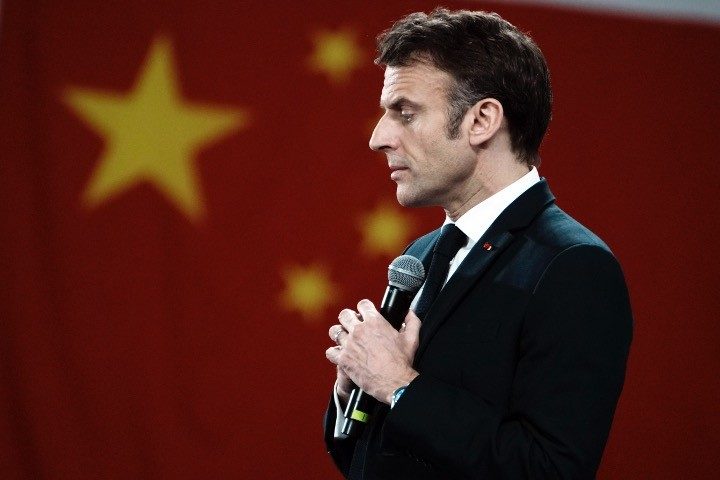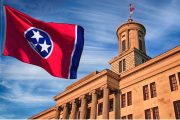
SINGAPORE — On April 9, in an interview with Politico Europe and Les Echos after a three-day state visit with Chinese authoritarian leader Xi Jinping, French President Emmanuel Macron stressed the importance of European “strategic autonomy” from the United States and that Europe should not follow America into any conflict with China over Taiwan. He also expressed his hope that Europe could become the world’s “third superpower,” with France leading the continent.
Although Macron’s remarks reiterated his goals for Europe to avoid military and economic dependencies, his comments on Taiwan triggered concerns and outrage on both sides of the Atlantic.
Les Echos cited Macron as saying: “Do we [Europeans] have an interest in speeding up on the subject of Taiwan? No. The worst of things would be to think that we Europeans must be followers on this subject and adapt ourselves to an American rhythm and a Chinese overreaction.”
“If the tensions between the two superpowers heat up … we won’t have the time nor the resources to finance our strategic autonomy and we will become vassals,” Macron added. “Europeans cannot resolve the crisis in Ukraine; how can we credibly say to Taiwan, ‘watch out, if you do something wrong we will be there’? If you really want to increase tensions that’s the way to do it.”
Similarly, Politico reported that Macron, who is a former Rothschild banker and a major advocate of a full-fledged European Union (EU) army, reiterated that Europe had to be strategically autonomous from the United States. He proclaimed that “the great risk” Europe faces is that it “gets caught up in crises that are not ours, which prevents it from building its strategic autonomy.” To that end, Macron aimed to beef up Europe’s defense infrastructure to curtail dependence on American arms manufacturers.
In addition to saying that Europe should look to reduce its reliance on the “extraterritoriality of the U.S. dollar,” he pointed out Europe’s vulnerability to the U.S. Inflation Reduction Act (IRA), a $369 billion “green” subsidy plan, while lauding “our European IRA,” alluding to plans to enhance homegrown green tech and green incentives.
In response to Macron’s remarks, U.S. Republican Senator Marco Rubio said that, if Macron spoke for all of Europe, then the United States should concentrate on containing China and leave Europe to tackle the conflict in Ukraine.
Rubio, who lost the Republican presidential nomination to Donald Trump in 2016, said that while he backed U.S. support for Ukraine, if Europe was going to choose sides over Taiwan. America had to rethink its European commitments. “Maybe, we should basically say we are going to focus on Taiwan and the threats that China poses, and you guys handle Ukraine and Europe.”
A Wall Street Journal editorial stated that Macron’s “unhelpful comments” would deal a blow to American and Japanese deterrence against China in the western Pacific, while encouraging U.S. politicians who wanted to cut down American commitments in Europe. “If President Biden is awake, he ought to call Mr Macron and ask if he’s trying to re-elect Donald Trump,” the paper said.
Norbert Röttgen, a German MP who is a member and former chair of the Bundestag’s foreign affairs committee, lambasted Macron for changing his trip to China into “a PR coup for Xi and a foreign policy disaster” for Europe. “With his idea of sovereignty, which he defines in demarcation rather than partnership with the USA, he is increasingly isolating himself in Europe.”
Likewise, Reinhard Butiköfer, a Green MEP who chairs the European Parliament’s China delegation, castigated Macron’s China visit as a “complete disaster.” Butiköfer, who has been sanctioned by Beijing over his position on human rights in Xinjiang, also claimed that Macron’s “pipe dream” of EU strategic autonomy and becoming a “third superpower” was “beyond the pale.”
Complicating the situation even further was Politico’s admission that the Élysée presidential palace edited Macron’s quotes as a condition for journalists speaking to the president, saying that the Élysée omitted statements where Macron had spoken “even more frankly” about Taiwan and Europe’s strategic autonomy.
In a footnote at the bottom of their report, Politico stated:
As is common in France and many other European countries, the French President’s office, known as the Elysée Palace, insisted on checking and “proofreading” all the president’s quotes to be published in this article as a condition of granting the interview. This violates POLITICO’s editorial standards and policy, but we agreed to the terms in order to speak directly with the French president. POLITICO insisted that it cannot deceive its readers and would not publish anything the president did not say. The quotes in this article were all actually said by the president, but some parts of the interview in which the president spoke even more frankly about Taiwan and Europe’s strategic autonomy were cut out by the Elysée.
Britain’s Daily Telegraph newspaper, citing a “source close to the story,” said that all three media outlets that were given an interview with Macron had to allow the Elysée to “proofread” and redact quotes before publication. The French media has a track record of publishing redacted interviews with the label “relu et corrigé” (re-read and corrected) below the headline.
Notwithstanding his dreams to lead Europe on geopolitical issues such as the Ukraine conflict and China-Taiwan ties, it remains uncertain if Macron has the domestic and regional clout to do so.
Back home, millions of French have taken to the streets over the past month protesting the French president’s contentious pension reforms. Aimed at raising the age of retirement in France, the reforms have triggered massive protests and even rioting across the country.
Exacerbating matters even more was the Macron administration’s decision to invoke the emergency powers of Article 49.3 of the French constitution to bulldoze the reforms through Parliament without a vote, intensifying anger and opposition.
Nicolas Bay, a French representative within the European Parliament, said in an interview with Breitbart Europe that Macron has “trampled on democracy” in the country by bypassing parliament with his pension reforms.
“What is amazing is that he could have won a parliamentary majority if he had proposed a more serious and comprehensive reform, and especially if he had taken the time to explain clearly what was at stake,” said Bay, a member of former presidential candidate Éric Zemmour’s Reconquête party. “But he decided to force his way through with a project that is not up to scratch…. The result is an unfair half-measure, opposed by more than two-thirds of the population, and which totally ignores the main challenge posed by the pay-as-you-go pension model: our declining birth rate.”
More than 1,000 law-enforcement officers and firefighters have sustained injuries while addressing the nationwide rioting and civil disorder over the past month, Macron’s Interior Minister Gérald Darmanin contended.
In an interview with Le Journal du Dimanche, Darmanin also accused the French far-Left and its leader, Jean-Luc Mélenchon, of stoking the violent unrest. Mélenchon, France’s equivalent of Bernie Sanders, recently cautioned that France had not witnessed what real violence looks like, likening the recent riots to student protests of 1968.
In turn, Darmanin said that such violence had led to hundreds of injuries and arson attacks since mid-March. “Since March 16, there have been 1,093 police officers, gendarmes and firefighters injured, 2,579 arson attacks, 316 attacks on public buildings and not a word from the far left to condemn this violence,” he said.
He went on to accuse the country’s militant left wing of “intellectual terrorism” by accusing the police of violently attacking certain protesters, arguing that this is a complete reversal of what is actually happening on the ground.
“When the police use legitimate force, it can obviously be strong, but it is to respond to extremely violent attacks by professional thugs, who are there to destroy property, or, worse, to ‘kill cops,’” the minister claimed, elaborating that most French police do their jobs with “honor.”
“The freedom to demonstrate is a fundamental right. Almost all of the demonstrations took place without any incident,” he insisted. “But the freedom to demonstrate is not the freedom to demonstrate violently…. When violence, thugs and the ultra-left get involved, then it is the duty of law enforcement to say stop.”
Bay pointed out that the violent actions from leftists could inspire Macron to order a police crackdown against the movement should protests get out of control.
“It is mostly an agitation of the far left led by Jean-Luc Mélenchon and the overprotected unions who only know how to do two things, block and break, always to the detriment of the working French,” he said. “Macron lets it happen because it will allow him to play his own score: to make people forget his bad reform, he will pretend to restore order in the streets.”



